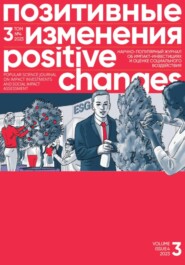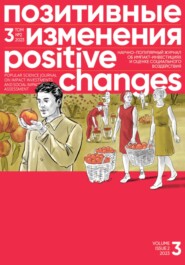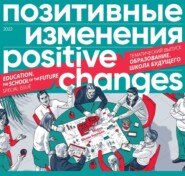По всем вопросам обращайтесь на: info@litportal.ru
(©) 2003-2024.
✖
Позитивные изменения. Том 3, № 3 (2023). Positive changes. Volume 3, Issue 3 (2023)
Настройки чтения
Размер шрифта
Высота строк
Поля
The Fellowship Program evolved and transformed over time. Today, it includes a personal scholarship competition for students of 75 universities participating in the program, as well as a number of other initiatives, such as the Foundation School – an annual event for Fellowship Program participants aimed at fortifying the Foundation’s community and developing social competencies and soft skills among fellows and grantees.
Since its foundation and up to the present day, social responsibility has been, and continues to be, one of the central and defining aspects of the Fellowship Program. It was the notion of social responsibility that became the cornerstone of the revamped format of the Foundation School in 2021, which for the first time was conducted in an online format due to the COVID-19 pandemic. At that time, the focal theme of the School revolved around the quest for novel approaches to addressing socially significant challenges. Participating students from Russian universities were provided with real-life appeals from the non-profit sector to solve issues aimed at positive changes in local communities and the work of NGOs. The School’s activity culminated in a competition showcasing socially significant projects undertaken by students. Subsequently, the teachers joined this initiative, reshaping these socially-oriented endeavors into collaborative team efforts rather than individual pursuits, garnering support from universities.
In 2023, for the second year in a row, the Foundation School is being held in the format of volunteer camps in protected areas and cultural heritage sites across Russia. A total of 200 students and teachers, winners of the Fellowship Program grant competition, have ventured into Russia’s protected territories and cultural heritage sites as volunteers. Their mission entails addressing pressing challenges such as trail making, infrastructure repairs, landscape enhancements, etc.
Among the Foundation’s initiatives directed towards fostering the development and dissemination of the principles inherent in the third mission concept is a grant competition for university teachers. This competition significantly influences the advancement of the third mission by fostering professional communities and encouraging collaboration with external partners in the development and implementation of educational products.
An illustrative example of community engagement, introducing students to potential career avenues within the non-profit sector, enhancing NGO professionalism, and meeting regional demands for skilled personnel is the launch of a new training course tailored for law students at P. G. Demidov Yaroslavl State University. The main objective of the course was to involve students in the work of public organizations in Yaroslavl Region. The course was developed with the support of the Vladimir Potanin Foundation: in 2016, the project won a grant competition for university teachers. The course is designed to address the lack of interest in the non-profit sector as a source of employment for law students entering the job market. At the same time, a number of organizations in the region, in particular, the Yaroslavl Region Department of the Ministry of Justice of Russia and the Yaroslavl Region Department of Public Relations, were experiencing a systemic shortage of personnel familiar with the NGO activities.
In addition to traditional training sessions, the course included internships based on collaboration with various organizations. Cooperation agreements were signed with the Public Chamber of the Yaroslavl Region, the Commissioner for Human Rights and the Commissioner for Children’s Rights in the Yaroslavl Region, the Yaroslavl Regional Branch of the Russian Lawyers Association and other organizations. During their studies, students visited organizations ready to accept future lawyers for internships, and communicated with professionals from the civil sector. More than 30 students completed internships in the office of the Yaroslavl Region Commissioner for Human Rights, while more than 20 students underwent internships at the Resource Center for Non-Profit Organizations of the Yaroslavl Region. This course opens up novel avenues for young individuals to put their newly acquired knowledge to practice and substantially broadens their understanding of potential career opportunities.
FINDING OWN WAYS: SUPPORTING PRIVATE UNIVERSITY INITIATIVES
Each university seeks and finds its own ways, opportunities and resources to fulfilling the third mission, and the Vladimir Potanin Foundation can present many interesting examples of supporting universities in implementing socially responsible initiatives – not only through individual scholarships, but also through project grants.
One such example is the Granite of Science project at Tomsk State University. Its goal is to create a new cultural environment in Siberia. The space brings together education and creativity, communications and new technologies, charity and volunteering. The project team conducts activities in three areas. At the “Science Slam TSU” battle, academics popularize science to a wide audience through the prism of their own experience and share the “behind the scenes” secrets of research work. The “Scientific Volunteering” direction allows volunteers to try their hand at real research work – collecting or processing data, conducting surveys, etc. Finally, the third direction – “Science and Art” – offers an opportunity to engage with science through artistic images, emotions, and sensations: visitors of Art & Science exhibitions acquaint themselves with the latest discoveries, achievements, technologies, and their impact on daily life.
With the support of the Vladimir Potanin Foundation, the Institute of Social and Economic Design of the National Research University Higher School of Economics (ISEP HSE) held a two-month accelerator program “The Third Mission of the University for the Development of Cities and Regions” in 2023. Eight universities were shortlisted to participate in the program: Altai State University, Volgograd State University, Murmansk Arctic State University, Petrozavodsk State University, Volga Region Academy of Education and Arts named after St. Alexis, Metropolitan of Moscow, Ural Federal University named after the first President of Russia B. N. Yeltsin, South Ural State University, P. G. Demidov Yaroslavl State University. The accelerator’s purpose is to support universities in the implementation of the third mission by expanding collaboration with non-profit organizations, municipal and regional administrations, businesses, as well as by reinforcing cross-sector intra-university partnerships.
CREATIVE SYMBIOSIS BETWEEN FOUNDATIONS AND UNIVERSITIES
The above examples from the experience and practice of the Vladimir Potanin Foundation describe only a small part of the possible areas of work within the discourse on the development of the third mission. In reality, the formats and approaches to its implementation are literally countless. The Foundation has been working on this for more than two decades, and while initially the third mission support was limited to individual student scholarships, today universities themselves are increasingly active and inventive in developing formats for social initiatives, scaling them up, making them more complex and reproducing them on their own.
Universities are therefore becoming reliable and competent partners for grant-making organizations and private foundations. Thanks to mutually beneficial cooperation between universities and nonprofits, socially important goals can be achieved with maximum efficiency.
As a result of interacting with the universities, foundations gain access to their academic potential. This enables grant providers to focus their efforts on specific areas of expertise, supporting projects and programs that contribute to addressing urgent societal challenges. In turn, universities receive support for advancing research, diversifying, and enriching the educational process. In addition, non-profit organizations help young specialists to acquire sought-after professional skills, enabling them to step into the job market after graduation while fully revealing their potential.
Together, charitable foundations and universities are capable of constructing resilient connections bridging the academic realm and society’s genuine needs. This involves translating scientific achievements into practice, impacting the quality of people’s lives, fostering technological advancements, and seeking solutions to global challenges. Thus, the collaboration between charitable foundations and universities is a creative symbiosis that advances social progress and leads to sustainable positive change in the world.
REFERENCES
1. Shek, D. T. L. & Hollister, R. M. (2017). University Social Responsibility and Quality of Life (Vol. 8). Springer Nature Singapore Pte Limited.
2. Balmasova, T. A. (2015). The University’s Third Mission in the Conditions of Modernization of Russian Education. Topical Issues of Social Sciences: Sociology, Political Science, Philosophy, History, 11(51), 36–41.
3. Balmasova, T. A. (2016). The University’s Third Mission: A New Development Vector? Higher Education in Russia, (8–9), 48–55.
4. Golovko, I. V., Zinevich, O. V. & Ruzankina, E. A. (2018). The University’s Third Mission and the Multi-User Governance Model for Regional Development.
Comparative politics. Russia, 9(1), 5–7. http://dx.doi. org/10.18611/2221–3279–2018–9–1–5–17
5. Kudryashova, E. V. & Sorokin, S. E. (2019). The “Third Mission” in the Development Programs of Russian Universities (Using the Example of Universities in the North-West Federal District). Knowledge, Understanding, Skill, (4), 78–88. https://doi.org/10.17805/zpu.2019.4.6
6. Kudryashova, E. V. & Sorokin, S. E. (2020). The Universities’ Third Mission as a Subject of Scientific Analysis. Bulletin of Vyatka State University, 136(2), 17–23. https://doi. org/10.25730/VSU.7606.20.020
7. Marhl, M. & Pausist, A. (2013). Third Mission Indicators for New Ranking Methodologies. Continuing Education: 21st century, 1. Retrieved from: http://lll21.petrsu.ru/journal/ article.php?id=1949 (Accessed: 27.07.2023). http://dx.doi. org/10.15393/j5.art.2013.1949
8. Medushevsky, N. A. (2016). Interpreting the Universities’ Third Role at the Contemporary Stage. Bulletin of the Russian State University of Humanities. Series: Political Science. History. International Relations. Foreign Regional Studies. Oriental Studies, (3), 19–31.
9. Perfilyeva O. V. (2011). University and the Region: Towards the Implementation of the Third Function. Bulletin of International Organizations, (1), 133–144.
Вузы и социальные предприниматели: зачем они друг другу?
Взаимодействие университетов и социального бизнеса – распространенная практика во всем мире. Программы стажировки, преподавание отдельных дисциплин, наставничество, совместные проекты и исследования – социальные предприниматели могут сотрудничать с вузами в разных форматах. Как выиграть от такого партнерства и к чему надо быть готовым обеим сторонам? Рассмотрим, как «третья миссия» университетов проявляется через взаимодействие с социальными предпринимателями на примере опыта выпускников программ и членов сообщества Impact Hub Moscow.
Ирина Лактюшина
Журналист, координатор программ Impact Hub Moscow
ИСТОКИ СОТРУДНИЧЕСТВА И ЗАРУБЕЖНЫЙ ОПЫТ
В конце 1990-х годов американский ученый, профессор Грегори Диз представил социальное предпринимательство (СП) как профессию и область для изучения. В 1995-м году в Гарвардском университете США он прочитал первый в мире курс по социальному предпринимательству. С тех пор преподавание СП в зарубежных вузах стало распространенной практикой и число таких учебных заведений постоянно растет: в 2002 году насчитывалось только 10 подобных университетов в США, в 2008 году их стало уже более 100 в 35 странах мира[65 - Brock, D. D. & Steiner, S. (2009). Social entrepreneurship education: is it achieving the desired aims?. Retrieved from: https://ssrn.com/abstract=1344419. (accessed: 11.08.2023). http://dx.doi.org/10.2139/ssrn.1344419Available at SSRN 1344419.].
С того времени количество таких дисциплин в зарубежных вузах постоянно росло, и, как отмечают авторы аналитического отчета «Университеты и социальное предпринимательство»[66 - Фонд «Наше будущее» & НИУ ВШЭ. (2021). Университеты и социальное предпринимательство. Формирование партнерства университетов, ЦИСС и других субъектов развития социального предпринимательства: аналитический отчет. Режим доступа: http://nb-forum.ru/uploads/images/documents/137_a33f3.pdf. (дата доступа: 11.08.2023).], в 2016 году сотрудники британского Плимутского университета провели исследование и опросили представителей 205 вузов из 12 стран[67 - The British Council. (2016). Social Enterprise in a Global Context: The Role of Higher Education Institutions. Country Brief: California, USA. Retrieved from: htps://www.britishcouncil.org/sites/default/files/usa_california_-_social_enterprise_in_a_ global_context_-_final_report.pdf. (accessed: 11.08.2023).]. Ученые выяснили, что 153 из них работали с социальными предпринимателями на момент опроса, а три четверти неработающих собирались начать такое сотрудничество в будущем. Учебные заведения привлекают СП для поддержки своей образовательной программы, например, в качестве участников внеучебных мероприятий, наставников или судей в деловых соревнованиях. Наряду с этим 67 % опрошенных сообщили, что социальные предприниматели вовлекаются в преподавание учебных программ.
Вы ознакомились с фрагментом книги.
Приобретайте полный текст книги у нашего партнера:
Приобретайте полный текст книги у нашего партнера:














